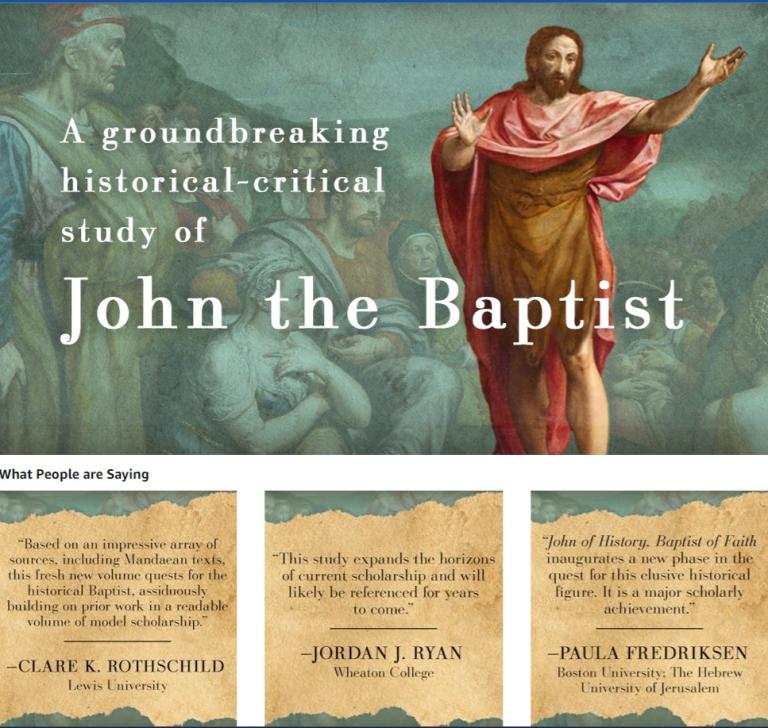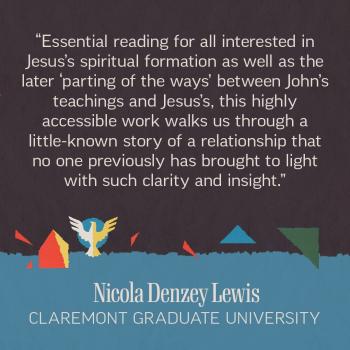Both of my recent books about John the Baptist are part of the sale that Eerdmans currently has going on, and can be purchased for only $9.99 from the Eerdmans website or Amazon. The A to Z of the New Testament is also part of the sale and only $6.99! If you subscribe to Eerdmans’ email newsletter, John of History, Baptist of Faith is featured as their book of the month.
There will be a review panel about that book at the SBL Annual Meeting in San Diego in November. Here’s the lineup of panelists:
- Adela Yarbro Collins, Yale University
- Joel Marcus, Duke University
- Clare Rothschild, Lewis University
- Charles Haberl, Rutgers, The State University of New Jersey
- Cecilia Wassén, Uppsala Universitet
- Edmondo Lupieri, Loyola University of Chicago
This is but one session related to John the Baptist, offered by our new John the Baptist program unit. I will also be presenting at SBL in a session about editorial fatigue. My presentation will be about one of the many new and groundbreaking proposals offered in my latest book. The Infancy Gospel of James starts out as a story about Mary yet with parents who are throughout reminiscent of John the Baptist’s parents Zechariah and Elizabeth. Suddenly at the end it ceases to be about Jesus or his parents and instead focuses on John (not previously mentioned) and his parents. This ending has been treated as an addition taken from a Baptist source. What I propose is that it is rather a less-redacted part of the source material used by the person who turned what had originally been a story about John’s infancy into one about Mary.
For those in the Midwest, there will be a different session about my new book at the Midwest Regional Meeting for Biblical Studies in 2025:
Sunday Morning Plenary Book Panel Session
The book panel will focus on the new volume, John of History, Baptist of Faith: The Quest for the Historical Baptizer, by James F. McGrath, Clarence L. Goodwin Chair in New Testament Language and Literature and Chair of the Department of Religion and Philosophy at Butler University.
There have been a few opportunities to talk about this with podcasters. Here are the most recent in case you missed them.
It is astonishing that there is still no academic edition of the Mandaean sacred text the Great Treasure (Ginza Rabba) in English. There are a couple of translations that rely heavily on Mark Lidzbarski’s German translation from roughly a century ago, but nothing undertaken by linguists and other scholars that takes the latest work on ancient Aramaic into account. I hope to work on rectifying this, collaborating with a linguist as I did previously. The translations that have been made can nonetheless give a taste of what is in the Great Treasure and why I am hopeful that academics interested in ancient Christianity and Judaism will turn their attention to this. Note these two examples of ethical teaching in a Mandaean source that have close parallels in the Bible.
- “If you see anyone hungry, feed him; if you see anyone thirsty, give him a drink” (Right Ginza I.105, repeated in 2.1.42). The fuller section is, “My chosen ones, if you see someone hungry, feed him. If you see someone thirsty, give him something to drink. If you see someone naked, put clothes and coverings on his neck. For everyone who gives receives, and everyone who lends receives a reward.”
- “Give alms to the poor. When you give do not attest it. If you give with your right hand do not tell your left hand. If you give with your left hand do not tell your right hand.” (Right Ginza II.i.34)
Add to this our Mandaean Book of John edition, out for several years now but still not widely cited by New Testament scholars, and there is much more. Not only are there versions of John the Baptist infancy stories and the account of John baptizing Jesus, but there is also a parable about a good shepherd. As I note in my new book John of History, Baptist of Faith, there are also other intersections. When Jesus spoke of “fishers of people” he was probably using an image that John had used, since the Book of John includes a parable of the “soul-fisher.” (As an aside, that section almost caused Lidzbarski to quit working on the project, since he found himself making little progress as he asked random people from the region about difficult words. My collaborator on the project Charles Haberl harnessed the potential of modern technology and talked to an Iraqi fishing organization to get to the bottom of some of the linguistic mysteries that completely flummoxed Lidzbarski.














